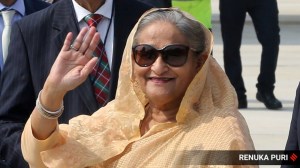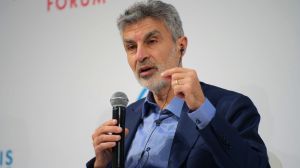Intimations of greatness
When Spiderman’s uncle Ben realises that his nephew has acquired supernatural powers he has a word of sage advice for his energetic and...

When Spiderman’s uncle Ben realises that his nephew has acquired supernatural powers he has a word of sage advice for his energetic and eager nephew: ‘‘With great power comes great responsibility.’’ Spiderman’s guiding principle has become a leitmotif of strategic policy thinking in the United States, particularly after 9/11, and may come to haunt the Bush Administration as it grapples with the challenge posed by Saddam Hussein.
Trying to articulate the responsibilities of a ‘great power’ in the post-9/11 world, US President George Bush Jr published last week a policy document under presidential seal entitled ‘The National Security Strategy of the United States of America.’ The document sets out a new policy paradigm of ‘pre-emption’, as opposed to deterrence, which is to guide US security strategy in the near term.
Unlike the fate of a similar document prepared in India by the National Security Advisory Board that must be gathering dust in some governmental almirah marked ‘secret’, the US president’s strategy paper is available free for anyone who wants to read it on the internet at http://www.globalsecurity.org.
Apart from offering an overview of US international strategy, especially in the campaign against terrorism and the use of weapons of mass destruction, and apart from enunciating important principles with respect to the defence of democracy and of free markets and free trade, the presidential paper also paints a picture of the world today as the US sees it.
The interesting novelty here for Indian readers is the fact that for the first time a US presidential paper gives its imprimatur to the Henry Kissinger view of India as a ‘potential’ Great Power. Kissinger expressed the view in 1994 that the 21st century would have five or six great powers: The US, European Union, Russia, China, Japan and, ‘probably India’.
|
A competitive economy is the foundation of power in the modern world. India has not yet completed the task of building that foundation |
Years later, in a more recent book on US foreign policy, Kissinger repeated this formulation without removing the prefix, even though India had become a declared nuclear power in 1998. When asked what in his view it would take even nuclear India to rid itself of his prefix, his answer was categorical: a larger economy and greater economic engagement with the world and the ability to realise the strategic potential of that economic power.
A competitive economy is the foundation of power in the modern world. India has not yet completed the task of building that foundation. Hence there is considerable distance to be covered before we can claim ‘great power’ status, even of the kind China now enjoys as a trading power. The Bush paper, therefore, quite understandably still refers to India, in fact along with China, as a ‘potential great power’.
While the first reference to India in the Bush strategy document is in the context of South Asia wherein the US underscores the need for India and Pakistan to ‘resolve their disputes’, and the Bush Administration draws attention to the fact that it has ‘invested time and resources building strong bilateral relations with India and Pakistan’, the only other reference to Pakistan is in the context of the ‘war against terror’. India finds further mention on its own, with no further reference to the P-word! That is a message we have to internalise. To be able to view ourselves in the world without reference to our adversaries.
India figures in the chapter on cooperative action with ‘Other Main Centres of Global Power’. ‘‘We are attentive to the possible renewal of old patterns of great power competition’’ says the strategy paper, ‘‘Several potential great powers are now in the midst of internal transition — most importantly Russia, India, and China. In all three cases, recent developments have encouraged our hope that a truly global consensus about basic principles is slowly taking shape.’’ Listing out common areas of interest between the US and India, including the ‘‘free flow of commerce through the vital sea lanes of the Indian ocean’’, the fight against terrorism, defence of democracy and ‘‘creating a strategically stable Asia’’, the paper admits to differences on India’s nuclear programme and the ‘pace of economic reforms’. However, the paper says, ‘‘while in the past these concerns may have dominated our thinking about India, today we start with a view of India as a growing world power with which we have common strategic interests. Through a strong partnership with India, we can best address any differences and shape a dynamic future.’’
One area of difference which is going to engage the two countries in the near term is multilateral trade policy. The Union commerce ministry is holding on to the fiction that a new round of trade negotiations has not yet been launched. Bush’s strategy paper, on the other hand, not only refers to the ‘‘new global trade negotiations… (launched) at Doha… ’’ but says that its ‘ambitious agenda’ covering trade liberalisation in manufacturing, services and agriculture is scheduled for completion by 2005.
Going beyond multilateral trade liberalisation, the Bush doctrine is pushing for greater action in regional free trade agreements and bilateral free trade agreements. Apart from a Free Trade Association of the Americas, an Asian Free Trade Area, including China, Japan, Korea and ASEAN is taking shape. What about India?
Unless we come to terms with the political challenge of globalisation and the challenge of sustained economic growth, the Kissingerian prefix of our ‘probably’ being a Great Power will linger longer than even our ill-wishers presume. Sustained high rates of more equitable economic growth and domestic political and social stability are essential requirements of national power. If growth falters, if political and social divisiveness becomes pronounced, not even our most ardent well-wishers will be able to help us.
For precisely this reason, those who do not wish to see India regain its glory will do their best to disrupt the social and political stability that is required for our economic progress. Must we help them with our acts of ommission and commission?
Email the author





- 01
- 02
- 03
- 04
- 05


























